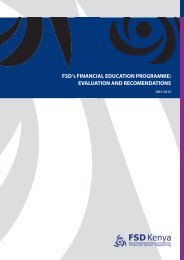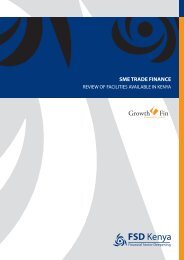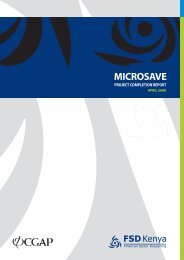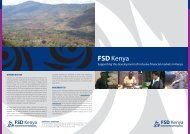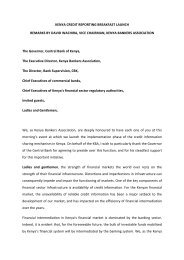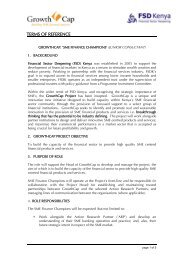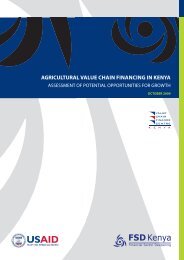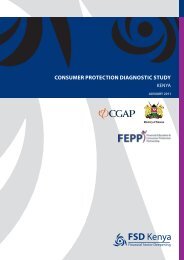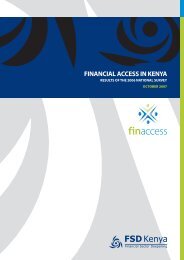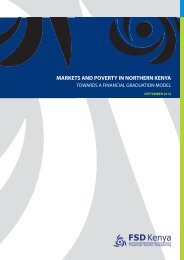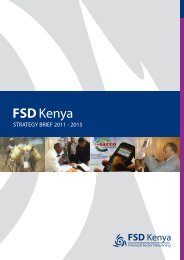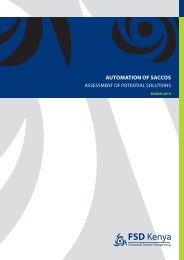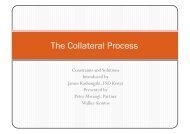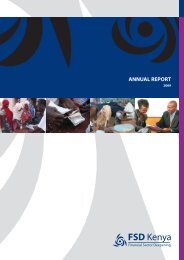FINAL REPORT - FSD Kenya
FINAL REPORT - FSD Kenya
FINAL REPORT - FSD Kenya
Create successful ePaper yourself
Turn your PDF publications into a flip-book with our unique Google optimized e-Paper software.
What are some of the<br />
things that you spend<br />
money on in your<br />
household?<br />
How do you keep some<br />
money aside for future<br />
need?<br />
If you were to use certain<br />
institutions to send or<br />
receive money, which<br />
one would you prefer?<br />
Why?<br />
• Clothing<br />
• Transport<br />
• Fees<br />
• Shelter<br />
• Keep livestock e.g. goats, for future sale: “We invest in livestock with the aim of<br />
selling them when the price is good”<br />
• Keep savings in a cash box “We feel the box is safest”<br />
• With the shopkeeper “We keep money in the local shop so that we do not lose it…if we<br />
keep it at home we will misuse the money”<br />
“We do not have post office or bank in this area”<br />
The respondents rely on the road transport for money transfer.<br />
xiii. Focus Group Discussions with OVC Guardians in Dertu.<br />
Point of discussion Discussion<br />
Economic activities Charcoal selling, grocery shop, herdsman<br />
What are the • Lack of basic needs and difficulty in sustaining the orphaned children due to lack of<br />
difficulties you face meaningful employment. Respondents found it difficult to meet the day to day<br />
in taking care of needs of the family.<br />
these children? • Clothing - Due to the high poverty level the respondents cannot afford a decent<br />
clothes and have resorted to use if mitumba cloths which are cheap and which is<br />
within their reach in terms of affordability.<br />
• Education - Although primary education is free in this area and <strong>Kenya</strong> in general<br />
participants have to meet the high cost of secondary education and uniform for<br />
their primary education as well as other expense on attaining non formal education<br />
such as fees for madrasa and duksi. Participants have to bear the burden of paying<br />
the salary of these teachers in the non formal sector.<br />
• Poor shelter – The respondents are housed in makeshift shelters which are prone to<br />
flooding. Due to the on-going heavy rain most of the members are homeless with<br />
poor or even no bedding. This has made some seek refuge at camps of<br />
humanitarian agencies. Most complained from lack of nets making them vulnerable<br />
to mosquito bites and malaria is a common in this flooded area which has become a<br />
breeding ground for mosquitoes.<br />
How have you been Most of the members have taken their children to school under the free primary<br />
able to solve some of education programme. This, they said, will alleviate their problems when the<br />
these difficulties you children graduate from primary and secondary education and get employment at a<br />
face in taking care of later date.<br />
these children Some members have resorted to income generating activities such as sale of<br />
firewood, charcoal burning and small scale retail shop.<br />
Taking the sick to hospital. However the distance involved in seeking medication at<br />
Garissa and lack of money for transport cost makes some to seek local herbal<br />
medicine and seek divine intervention through prayers.<br />
Seeking support from relatives-Poor members of the community source support<br />
from the well-off through charity/alms. Most of the members being predominantly<br />
Muslim their religion encourage the well off to contribute 2 ½ % of their gross<br />
assets to the poor annually.<br />
OVC Programme - All participants get KShs1,000 monthly from the District<br />
Children Office. This has assisted them greatly in secure and purchase of basics for<br />
34



